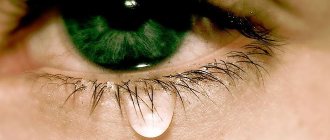Many people have experienced this unpleasant phenomenon themselves - vision becomes cloudy, it becomes difficult to focus, the eyes become dark, dizziness, and possible fainting. In most cases, this is due to insufficient blood supply to the brain, which causes oxygen starvation. The brain loses the ability to control the body and consciousness goes out.
If the listed symptoms rarely appear and are caused by a short-term deterioration in well-being provoked by external causes, then there is no particular reason for alarm. However, in more severe cases, sharp deterioration in vision is an alarming symptom; obaglaza.ru strongly recommends that you consult a doctor. Why does it darken in the eyes, what is the problem of causing such a phenomenon?
Darkening in the eyes: causes
Darkening of the eyes can occur for various reasons:
A sharp decrease in blood pressure as a result of heavy physical exertion. Moreover, this state of tension can occur both in weakened people, for example, when changing position (stood up sharply, bent down sharply), and in strong, healthy men (lifted a lot of weight, ran quickly).
Low level of hemoglobin in the blood A course of iron-containing medications, which should be prescribed by a doctor after passing the necessary tests, can help get rid of this problem.
Overwork Darkening of the eyes can occur as a result of overwork after intense, hard work. In this case, you can get rid of unpleasant symptoms if you get enough sleep regularly and get more rest, including in the fresh air.
Vegetative-vascular dystonia In this case, you can cope with problems in your health with the help of special medications prescribed by a doctor and compliance with a proper regimen.
Natural causes of symptom development
There are many provoking factors. They need to be considered not in isolation, but as a whole. Since we are often talking about diverse etiologies in the same patient.
Adolescence
As a rule, in young people the nervous system is still unstable. It is just being formed. Therefore, a variety of symptoms are possible. Including rapidly increasing headaches that also pass quickly, vertigo (with disorientation in space), nausea, vomiting.
The causes of darkening in the eyes of adolescents are excessive excitability with insufficient inhibition processes. This is normal. It does not require special treatment.
But to make sure it’s natural, you need to conduct a diagnosis. At a minimum, Dopplerography of blood vessels (basilar basin, vertebral and carotid arteries). Other techniques are also shown as needed.
Pregnancy
Peak hormonal state. Creates a colossal burden on the mother's body. Since the fetus’s own circulatory system is still incomplete, the main task of breathing and nourishing the body falls on the body of the expectant mother.
This results in a decrease in the functionality of the existing volume of circulating blood. This means that the quality of brain trophism will be insufficient.
The body, even with formal normal activity, loses its entire margin of safety.
The slightest provocateur is enough for a sharp drop in the quality of nutrition of the central nervous system and the development of darkening in the eyes. Most often, this condition occurs when standing up suddenly or when the weather changes. Treatment is also not required, but the expectant mother must be closely monitored.
Meteosensitivity
According to statistics, many people suffer from this problem; almost half of people around the world have felt a change in weather at least once in their lives.
In fact, this is the result of weakness and insufficient adaptability of the autonomic nervous system. The issue is completely solvable if you normalize your sleep and wakefulness patterns, physical activity, and adjust your diet.
In general, this phenomenon does not pose any danger. Although it creates enormous discomfort, it interferes with a normal life. Such changes are especially noticeable in patients during the summer months. Due to a drop in oxygen concentration in the atmospheric air, which only worsens the situation.
Increased physical activity
Changing the nature of activity has a negative impact, especially if a person is not sufficiently trained.
The heart rate increases, as does blood pressure, and therefore vascular tone too. But the pumping function does not increase.
That is, in one beat the organ throws out approximately the same amount of blood as at rest. Perhaps a little more, but clearly not enough to meet the needs of the muscles.
The brain, as the most sensitive organ to changes, suffers - this is the reason for darkening in the eyes during physical exertion.
Only one recommendation can be given: you need to increase the intensity of exercise gradually, adapting to past loads. Because all other options are dangerous. There is no treatment as such.
How to prevent darkening of the eyes?
To prevent darkening of the eyes when standing up and dizziness, we can recommend:
- physical activity (running, walking, exercise in the fitness center, swimming)
- regular visits to the bathhouse
- taking medications that strengthen the walls of blood vessels and prevent the formation of blood clots, for example TRANSVEROL
We switched to formula at seven months, since I ran out of milk, my friend advised me to take Materna “Extra Care”. I am very pleased with my choice, the mixture is good, dissolves quickly and easily, the child eats with pleasure. Since I try everything before giving it to my baby, I also tried this mixture, I personally liked it, it has a pleasant sweetish taste and good consistency. With this mixture we grow well and we don’t have tummy problems! We took the mixture from the baby1care website.
10 reasons why breastfeeding moms envy moms on IV
This is a case where the road to hell is paved with good intentions. By protecting your child’s psyche from feelings of guilt, you do not give him the opportunity to repent. Only a feeling of remorse, a feeling of regret for one’s bad actions, keeps one from repeating them. Instead of experiencing both the feeling of guilt and the feeling of loss with your child, you lied to him, you inspired him: “You are not to blame for anything, you are not to blame for anything.” This is how egoists are raised. Now, every time he acts badly, your son will repeat to himself: “I am not to blame for anything!” But your son has a conscience - he KNEW and UNDERSTOOD that the animal died, and that he was the reason for it. But he had no one to share his experiences with. You lied to your son - don't be surprised when he lies to you. You have once freed him from the feeling of guilt - do not be surprised when your grown, adult son refuses to admit his guilt in any way and take responsibility for his actions
A symptom that has been defined in medicine as orthostatic hypotension. The feeling of disorientation and slight failure to nowhere can last a matter of seconds or, conversely, lead to fainting. But, one way or another, this indicates the presence of somatic and neurological disorders.
Local visual problems
Do not forget that sometimes the cause of darkening in the eyes can be problems that are associated only with the visual analyzer itself. Among them are the following:
- visual field defects;
- violations of the integrity of the optic tract;
- optic nerve diseases.
Darkening is caused by pathological loss of visual fields. A sudden movement in this case, or a sharp turn of the head can cause such a reaction in the eye.
Patients with glaucoma and people with farsightedness and myopia also complain of similar problems after prolonged visual strain.
Problems can arise when the signal from the eyes to the brain is disrupted, which occurs when the optic nerve or optic tract becomes spasmed or paralyzed.
To determine an accurate diagnosis that will reliably show the source of the problem and possible ways to eliminate it, a comprehensive ophthalmological examination will be required, including ophthalmoscopy, refractometry and several other manipulations that the doctor deems necessary in a particular individual case.
Darkening in the eyes as a symptom and consequence of the disease
Why does it get dark before my eyes? The mechanism of development of this pathological condition is based on anoxia or hypoxia. This is the term that doctors use to describe the lack of oxygen in any organs and tissues of our body.
Oxygen deficiency, in turn, can be caused by impaired orthostatic reactions or the result of malfunctions of the cardiovascular system.
A decrease in blood pressure due to the expansion of the capillary lumen, leading to a change in blood flow and a sharp outflow of blood from the brain tissue.
Vegetovascular dystonia.
Failure of the heart rhythm, provoking cerebral perfusion (deterioration of blood supply to the brain).
Iron deficiency anemia with a significantly reduced hemoglobin content in the blood.
Aortic aneurysm due to dissection.
Chronic fatigue.
“Often, providing half an hour of rest can bring a person back to normal without medical intervention. "
But driving vehicles and machines in production is contraindicated for people in this condition. How to recognize why it darkens in the eyes in order to competently stop the pathological process?
Pregnancy period
While carrying a child, many women complain that their vision becomes dark when standing up. The reason for this may be hormonal changes in the body, a sharp decrease in hemoglobin in the blood, and impaired blood supply leading to brain hypoxia.
What to do?
Symptomatic therapy. Sometimes it is enough to provide yourself with a comfortable regime - rest, timely sleep, walks in the fresh air.
Darkening of the eyes plus dizziness
If it gets dark in your eyes when you get up, plus dizziness is added to the sensations, then this indicates a violation of blood flow. Floaters before the eyes and short-term darkening during sudden bending and straightening of the body may be a consequence of a violation of the innervation of blood vessels - a slow change in the lumen in them. At the same time, it is necessary to solve the problem of cervical osteoporosis and vegetative-vascular dystonia.
What to do?
Medical examination followed by prescription of nootropic and vascular drugs. Physiotherapy and massage will help reduce the symptoms.
Preventive measures
Individually selected complexes that strengthen the musculoskeletal and cardiovascular systems will help minimize the manifestation of such symptoms. Topping the list are banal walking, swimming and classes with a fitness instructor.
Visiting the sauna trains and strengthens the blood vessels of the brain. Medicine also offers its own ways to prevent the problem by prescribing courses of restorative therapy, the essence of which boils down to taking vitamins, anticoagulants and heart medications.
Many people know firsthand a condition in which the vision suddenly becomes dark and dizziness occurs. It can be difficult to immediately determine the cause of this phenomenon. Therefore, if these signs appear, you should consult with a general practitioner, and if necessary, he will refer the patient to a highly specialized specialist, for example, a neurologist or cardiologist.
For some, the duration of such an attack does not exceed a few seconds and is explained by ordinary fatigue. For others, such a reaction of the body indicates severe disturbances in its functioning.
Diagnosing the problem
If you suspect such a problem, you should immediately consult a therapist and ophthalmologist. If this symptom is not a consequence of overwork, then a series of studies are prescribed.
These examination methods include the following four main types:
- MRI of the brain.
- MRI of the orbits.
- Computerized perimeter visual field testing, which can detect scotomas.
- MRI of the vessels of the neck and head, which diagnoses disorders in the circulatory system.
It is worth remembering that after visiting a doctor with a similar problem, a patient complaining of darkening in the eyes must be prepared for the fact that he will have to clearly answer many questions of interest to the doctor. It is necessary to describe in as much detail as possible what exactly the nature and signs of the symptoms are, how often the most serious of them or maximum darkening occur, whether the person has previously experienced injuries associated with damage to the skull and brain, and whether there have been certain diseases recently. Only after listening to a detailed answer from the patient, the doctor can prescribe the necessary examination with research from one or another specialist, and subsequently save the person from this serious problem.
Why do my eyes get dark and my head feel dizzy?
These symptoms often occur as a result of natural physiological processes that occur in the body. Reasons that do not pose a serious danger include the following:
- Increased concentration of adrenaline in the blood. This happens when a person finds himself in a stressful situation, gets overexcited, or experiences severe psycho-emotional shock.
- Long stay at altitude.
- Following strict diets, as a result of which the body is exposed to an acute lack of glucose.
- Taking certain medications - tranquilizers, antibacterial drugs, antiseptics.
- Sports training during which you have to sharply turn your head or torso.
In the above situations, in order to eliminate unpleasant symptoms, you need to get rid of the provoking factor. For example, calm down, stop drug therapy with specific medications, and start eating right. If, following these recommendations, improvements do not occur within a week, you should visit a doctor. The doctor will be able to identify the causes of this condition and, if necessary, prescribe appropriate treatment.
Why do you feel dizzy at normal blood pressure?
In a healthy person, severe dizziness, as a one-time factor, can be a consequence of prolonged exposure to the sun. After a sharp rise, I also feel dizzy. The same thing happens to people who abuse alcohol and tobacco products.
Diet or fasting can cause severe dizziness in a healthy woman. Poor health occurs against the background of weak immunity, due to hypothermia.
In what cases should you sound the alarm?
In most cases, the vision becomes dark and dizzy due to severe orthostatic hypotension.
The main clinical manifestation of this disease is a sharp decrease in blood pressure to critical values. Experts associate the occurrence of this condition with a change in body position, for example, when a person gets out of bed after sleep. This disorder can vary in severity. Its mild form is characterized by symptoms that resemble a fainting state. Dizziness, blurred vision, nausea occur, and the person is afraid of losing consciousness. Sometimes sweating increases, and a feeling of constriction appears in the epigastric region. The attack usually lasts no longer than five minutes.
With disorders of high severity, psychosensory disturbances appear. The severity of the above clinical manifestations increases significantly. Low blood pressure can cause fainting. This attack lasts approximately 20 seconds.
There are some diseases that are characterized by similar symptoms. Among them:
- Vegetovascular dystonia. With this disease, the patient feels dizzy and has a severe headache. The location of the pain syndrome in most cases is the temporal and occipital region.
- Cervical osteochondrosis. The disease is characterized by the appearance of the above-described symptoms in the morning and evening. The head begins to feel more dizzy when it is turned, as well as when a person bends over or suddenly changes body position.
- Migraine. In addition to severe headaches, the condition is accompanied by dizziness, tinnitus, photosensitivity, nausea and other symptoms.
- Diseases of the inner ear, which are caused by dysfunction of the vestibular apparatus.
- Inflammation of the inner ear. For example, otitis media, in which the ears become blocked, the ears hurt and the head feels dizzy, especially when changing position.
- Traumatic brain injuries.
- Trinitarian neuralgia. A signal of the development of such a disease is clouding in the eyes. In this case, therapy must be started as quickly as possible, otherwise adverse consequences may develop. Treatment in most cases comes down to the use of antibiotics.
- Oncology of varying severity. With such a disease, a person experiences the symptoms in question almost every day.
If you experience constant dizziness and dark vision, you should consult a competent specialist. Under no circumstances should the situation be left to chance and these clinical manifestations ignored. When a comprehensive examination is carried out, the doctor will be able to determine the cause of this phenomenon and prescribe the necessary treatment.
Dizziness and blurred vision are signs of a stroke
Sudden dizziness and blurred vision may indicate the development of a stroke, since these are the symptoms observed in the first stage. In this case, you cannot waste a second - you must immediately call an ambulance.
In addition to the above clinical manifestations, the following signs may indicate a stroke:
- squinting eyes;
- speech problems;
- facial asymmetry.
Even if at least one of these symptoms occurs, this may already indicate a stroke. The headache does not always hurt. If such attacks appear regularly, circulatory disorders in the brain can be suspected. If you leave this problem unattended and do not take appropriate measures, the consequences can be very sad. In severe cases, a stroke leads to paresis and paralysis, as a result of which a person may remain disabled for life.
What to do?
When a person nearby experiences symptoms such as darkening of the eyes and dizziness, it is imperative to provide him with first aid. The best thing to do in this case is to call a team of medical workers, and then carry out the following manipulations:
- If this happens indoors, open the window slightly to allow sufficient oxygen to flow in.
- The victim must be laid down very carefully and the clothes that are squeezing his body must be unbuttoned.
- Try to calm down.
- The patient's legs should be slightly elevated. This will allow blood to flow better to the brain.
Some people who find themselves in similar situations know what caused this condition and can tell you what needs to be done. Thus, a person suffering from diabetes will explain that he did not eat on time. You can help him by giving him sweetened water to drink. Then measure your blood sugar levels using a special device - a glucometer.
What are you not allowed to do? If a person develops a severe headache, dizziness, or blurry vision, do not leave him alone. A sharp deterioration in the patient's condition may occur, which can even lead to death. In addition, experts do not advise trying to help the victim with the help of available medications. Based on such clinical manifestations, it is not always possible to accurately determine the cause of the condition. Self-medication in some cases only leads to blurring of symptoms, which is why even a doctor will not immediately be able to understand what happened to the patient. In addition, some medications can cause allergies, anaphylactic shock, and other side effects.
Signs of vertigo syndrome
Dizziness is divided into systemic (vestibular) and non-systemic. Systemic vertigo refers to the illusory rotation of objects around the patient or the patient around objects, a change in the position of the body in space - falling, as if into an abyss, or taking off.
Associated signs that darkening of the eyes and dizziness have appeared are loss of balance, stuffy ears or one ear, nausea. This type of dizziness indicates that some parts of the central nervous system or ears are affected.
Non-systemic dizziness includes sensations of rotation inside the head. Symptoms include staggering while walking (“drunken gait”), weakness, double contours of objects, darkness in the eyes when standing up suddenly, and a feeling of a veil. The cause of this condition may be a dysfunction of the brain. In this case, attacks can last seconds or even several days.
Diagnostic methods
A patient who consults a doctor with complaints of constant dizziness and blurred vision may be prescribed several diagnostic procedures. The fact is that such symptoms often indicate hidden diseases that need to be treated urgently. To determine the cause of the condition, a comprehensive examination may be required, including the following measures:
- Pressure measurements.
- Ultrasound examination of the cervical spine and cerebral vessels.
- Magnetic resonance imaging to detect damage to brain tissue and the development of acute inflammation.
- Encephalography to assess the condition of blood vessels.
- Computed tomography to detect changes in the cervical vertebrae and the development of cancerous tumors.
- Fundus examination and eye pressure measurements.
- General blood test and biochemistry - to determine the content of blood sugar, cholesterol, hormones, hemoglobin.
- Culture and blood sampling to detect infectious and viral diseases that can cause dangerous inflammation of the brain.
- Neurological tests - if the development of vegetative-vascular dystonia and other neurological disorders is suspected.
Treatment recommendations
Only establishing an accurate diagnosis makes successful treatment possible. Any cause of dizziness with blackout requires specific treatment:
- blockage of cerebral vessels and problems with blood circulation - a course is being conducted to restore blood vessels;
- clouding of the vitreous - absorbable agents are used;
- infectious diseases - anti-inflammatory drugs;
- lesions of parts of the nervous system - leptids and magnetic stimulation.
The treatment regimen depends on the detected disease, which is accompanied by dizziness and darkness in the eyes. For example, anemia is easily corrected with vitamin complexes. VSD - medications to improve cerebral circulation and sedatives. And cervical osteochondrosis is cured by anti-inflammatory therapy.
The following procedures have proven themselves to be excellent:
- magnetotherapy,
- balneotherapy,
- massage,
- mud therapy,
- reflexology.
Very often after these measures the condition improves significantly.
When asked why vision darkens and dizziness, there is no definite answer. It should be realized that the pathologies that cause such unpleasant conditions are very different. If you feel dizzy or have dark vision, immediately contact a therapist and get examined. Once the cause is discovered, begin appropriate treatment immediately.
In what cases should you immediately contact specialists:
- If after dizziness the temperature rises.
- If pain begins in the muscle tissues of the arms and legs.
- For severe headaches.
- For prolonged attacks of dizziness.
- When blood or pus comes out of the ear.
When visiting, the doctor diagnoses:
- Audiography is done.
- An examination of the eyeball and optic nerves is carried out using a computer.
- Nuclear magnetic resonance and CT scan of the brain are being studied.
- Magnetic resonance imaging.
- Doppleography using ultrasound. Most often, the main arteries in the brain are examined.
- X-ray of the cervical spine and skull.
Treatment of dizziness with medication
After identifying the causes of the disease, the specialist prescribes medication:
- If your head is dizzy due to hypertension, then the patient should take a course of sedatives or blood pressure lowering drugs.
- For vestibular vertigo, the specialist recommends taking Cinnarizine or Scopolamine.
- Under no circumstances should you take medications without a doctor’s prescription and determine the dosage yourself.
- If your head is dizzy due to neurological problems, the following medications are prescribed:
- Betaserc 8 mg 3 times a day.
- Betahistine dosage is the same as the previous drug.
- Diphenhydramine 50 or 100 mg.
- Motilium for vomiting and nausea.
Folk remedies for treating dizziness
- Infusion of ginkgo biloba helps well. It is done like this: take a tablespoon of biloba leaves and pour a glass of boiling water, then put the mixture in a water bath and cook for 15 minutes. Afterwards, the infusion should be left for half an hour, then it is filtered. The course is 2 weeks, 1/3 cup of tincture 3 times a day.
- You can make tea from ginger. Hot water is poured into a thermos and a pinch of tea leaves is placed. The ginger is peeled and thinly sliced into slices and also placed in a thermos. Everything is mixed and infused for 30 minutes. You can drink tea 3 times a day.
- Freshly squeezed beet or carrot juice helps. This recipe was used back in the Middle Ages. But it is better to drink this juice on an empty stomach.
- For frequent dizziness, use pomegranate juice, especially it helps those people who have low hemoglobin.
- Tea is made from parsley seeds. First you need to grind them, and then brew 1 teaspoon with a glass of boiling water and leave for 8 hours. It must be consumed in small portions throughout the day.
- Linden, mint or lemon balm tea will help relieve attacks of dizziness.
- An infusion of clover inflorescences will help well. You need to take 1 tablespoon and pour a glass of boiled hot water.
- You can add seaweed powder to your food. It is sold in pharmacies. It will help stop attacks and saturate the body with phosphorus and iodine.
Treatment
To get rid of dizziness and blurred vision, you should know the cause, since it is the underlying disease that needs to be treated.
It is often enough to make adjustments to your diet, establish a daily routine, and eliminate the influence of factors that cause this condition for the symptoms to go away. But if there are dangerous disorders and inflammations, drug therapy will be required. In this situation, the patient may be prescribed the following medications:
- Anti-inflammatory and antibacterial drugs - for acute otitis media, as well as infections that affect the brain.
- Calming medications, antidepressants, as well as medications that normalize blood flow - for vegetative-vascular dystonia, pressure surges, stress and depressive conditions.
- B vitamins, calcium antagonists, agents that provide nutrition to the brain - during intellectual overload, hypoxia.
- Physiotherapeutic procedures, massage, medications that normalize tone - for osteochondrosis and other diseases of the cervical vertebrae.
- Preparations containing iron - for low hemoglobin.
- Hormonal drugs – for hormonal imbalances or disruptions in the endocrine system.
The duration, dose and regimen of therapy are determined by the doctor, taking into account the data obtained during the examinations.
Prevention
It is much easier to prevent any disease than to cure it later. If your head is spinning and your vision becomes dark as a result of physiological changes in the functioning of the body, you should try to adjust your lifestyle. To do this, experts advise getting more rest, not disrupting your work and rest schedule, eating a balanced diet, and avoiding stressful situations.
If the causes are physiological disorders, preventive measures will consist of the same. They just need to be supplemented with the therapy prescribed by the doctor.
Treatment Options
Feeling dizzy can happen for many reasons. Therefore, you should not ignore this symptom.
If its manifestations are also accompanied by darkening of the eyes, you should urgently seek help from a doctor. First, the doctor will prescribe a comprehensive examination of the body.
It usually includes MRI, ultrasound of the head and neck vessels, ophthalmoscopy and consultation with specialists. After this, the specialist will be able to determine the true diagnosis, which will determine further treatment tactics.
Why does it get dark before my eyes?
Most often, this condition occurs when the brain lacks oxygen or nutrients.
Oxygen or nutrient deficiency occurs when there is insufficient blood supply to the brain. This is possible as a result of:
- Low blood pressure (hypotension).
- Vegetative-vascular dystonia. There is a narrowing of the lumens of blood vessels due to their compression, blockage or disruption of venous outflow.
- Infectious diseases.
- Disorders of the cardiovascular system, for example, bradycardia.
- Injury
- When squeezing blood vessels or nerve roots due to cervical osteochondrosis, spinal hernia, aneurysm, tumor.
There may be situations when enough blood is supplied, but the oxygen and nutrient content in it is reduced. This happens, for example, with anemia. The blood glucose level drops sharply due to fasting, overwork, heavy physical and emotional stress, which can lead to darkening of the eyes.
Photo 1: Thyroid diseases, diabetes, hormonal imbalances - all this can be accompanied by a feeling of sudden darkening before the eyes. Source: flickr (fatihdisli1993).
A similar phenomenon occurs in adolescents during puberty. The same effect is observed with a sharp release of adrenaline, but the mechanism of action here is different: the pulse accelerates, the blood supply to the brain sharply increases - a malfunction of the nervous system.
Blood pressure and darkening of the eyes
The symptom of darkening of the eyes occurs most often in older people. It may appear when getting out of bed or from a chair. Often accompanied by dizziness and loss of consciousness. This condition is called orthostatic hypotension. People taking blood pressure medications, diuretics and antidepressants are at risk.
Normally, blood pressure should not change when body position changes. To achieve this, heart contractions increase and the blood vessels of the lower extremities constrict. This ensures sufficient blood supply to the brain. If the elasticity of blood vessels is impaired, the veins of the lower extremities are dilated due to varicose veins, due to the use of antihypertensive or other medications, the mechanism does not work. The brain experiences a lack of blood supply. This can result not only in fainting, but also in ischemic stroke.
Darkening in the eyes can also occur with a sharp increase in pressure or a hypertensive crisis.
Photo 2: If a person suffers from hypotension, then the brain is poorly supplied with blood and many external factors can trigger an attack: heat, physical stress, a sudden change in body position. Source: flickr (the season post).
Relatively physiological reasons
The following factors can be considered relatively physiological:
Dehydration
It ends with a decrease in the amount of circulating blood in the body. This leads to insufficiently active nutrition of cerebral structures.
Attention:
Dangerous conditions are possible and even probable. According to the type of transient ischemic attack or stroke.
Recovery is about rehydration. Intravenous infusion of solutions or sodium chloride, magnesium sulfate is possible to maintain heart function, glucose.
Special drugs such as Trisol and similar ones are used in critical situations. When there is a threat to life and health.
Excessive physical activity
It has already been said about it. Only in this case the intensity is even higher. Cardiac arrest and critical conditions are possible.
Use of certain medicines
Diuretics, insulin, if we are talking about diabetics, antihypertensive drugs, antidepressants of many types. And some other means.
These are kind of side effects. They go away on their own. But if therapy is carried out systematically, it makes sense to reconsider the scheme. Or prescribe a drug with a similar effect, but better tolerated by a particular patient.
Such causes usually do not require special correction and are eliminated on their own as soon as the peak period ends. For good or until the next exacerbation.
If necessary, medication or other mitigation of the clinical picture is possible. At the discretion of the treating specialist.
Orthostatic hypotension (when changing body position)
A typical conditionally pathological condition. It is characterized by a violation of blood redistribution. To put it simply, it is a hemodynamic disorder.
It gets dark in the eyes when a person gets out of bed due to a sharp change in the trophism of the brain: the lower part of the body receives significantly more nutrients and oxygen than the upper part.
This clinical condition leads to hypoxia of nerve tissues and cerebral structures. It should be noted that the brain is extremely demanding and “gluttonous”, therefore even minor fluctuations in hemodynamics result in deficits and classic neurological symptoms.
What to do if your vision gets dark
First of all, it is necessary to establish the reason why the eyes become dark. If this is a rare occurrence, there is no need to worry. It is worth carefully analyzing your life recently. In case of overwork, dieting, stressful situations, medical help is not required. You can cope with this yourself by eliminating provoking factors.
If darkening of the eyes is a common occurrence, you should consult a doctor to determine the cause. Further actions will be determined by the diagnosis. If the condition is a symptom of some general disease, treatment will be determined by that disease.
Note! If the cause of darkening in the eyes is orthostatic hypotension, you need to drink enough fluids, while limiting your salt intake. This will increase the volume of circulating fluid.
Those who have varicose veins should wear compression stockings or knee socks. You should not suddenly change your body position. You may need to discuss changing your antihypertensive drug with your doctor.
If the cause of darkening is low pressure, this can provoke not only fainting, but also collapse, then emergency medical attention is needed.
Interesting! To increase blood pressure, you need to put salt under your tongue.
In case of fainting, you need to lay the person down, make sure that the head does not fall back, you can bring a strong-smelling substance, for example, ammonia, so that the person comes to his senses faster.
Characteristics of diseases
The consequence of hypotension is a negative effect on brain cells due to oxygen starvation. With this syndrome, blood pressure drops significantly, because of this the brain does not receive enough oxygen and its cells begin to die, which is precisely manifested by darkening of the eyes, as well as headaches and nausea. Like any other serious health problem, this requires a certain course of treatment and a review of the patient’s lifestyle.
Vegetative-vascular dystonia has similar symptoms. The causes here are extensive and require long-term rehabilitation treatment.
If the problem with darkening of the eyes is caused by an infection in the body, the doctor will prescribe antibacterial drugs, which, along with eliminating the infection, will lead to the disappearance of symptoms associated with vision, headache, weakness and lethargy.
Also, darkening in the eyes is included in the primary list of factors that may indicate diseases such as osteochondrosis, various aneurysms, compression of arteries and nerve endings. In such situations, darkening and pain occur only with certain movements and positions of the body or its parts and will most often be the first symptoms of the emerging disease.










